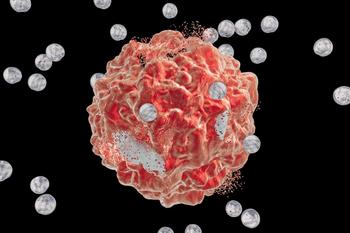
The study the FDA allowed to continue is investigating the safety and efficacy of the novel cancer drug ACR-368 in patients with endometrial, urothelial and ovarian cancer.

The study the FDA allowed to continue is investigating the safety and efficacy of the novel cancer drug ACR-368 in patients with endometrial, urothelial and ovarian cancer.

While Cabometyx had a favorable side effect profile, it did not lead to a significant survival advantage over placebo in a clinical trial.

The Strata PATH trial will use a novel testing strategy to determine if certain patients with solid tumors can benefit from already-approved therapies.

The primary objective of the early-stage trial is to determine the maximum tolerated dose of the novel drug in a group of patients with recurrent and/or refractory solid tumors.

Treatment with a combination of Ofev and chemotherapy was shown to have a survival benefit in a group of patients with bladder cancer.

Once a recommended dose of the drug is determined, the study investigators will review the efficacy and safety associated with this treatment across a variety of patients with bladder and liver cancer, as well other solid tumors.

The clinical development of BEMPEG plus Opdivo will end after clinical trials showed that the drug combination did not lead to significant improvements in outcomes in patients with kidney or bladder cancer.

Investigators plan to enroll approximately 90 patients with squamous cell carcinoma of the head and neck, as well as metastatic bladder and non-small cell lung cancer.

Researchers have treated the first patient in the PRECISION 1 trial with Fyarro to assess the drug’s efficacy across several endpoints including survival among more than 100 patients with solid tumors that exhibit certain genetic alterations.

A patient with an advanced solid tumor was given their first dose of a novel antibody, kicking off a phase 1/1b study comparing this drug with or without Keytruda in patients with several types of solid tumors.

Approximately 60 patients with metastatic/unresectable solid tumors, including bladder cancer, are expected to be enrolled onto a clinical trial assessing the safety and efficacy of Zepzelca.

The trial will be testing TARA-002 in patients with non-muscle invasive bladder cancer with high-grade carcinoma in situ and high-grade papillary tumors.

From Pfizer issuing a voluntary recall of three blood pressure drugs due to a high level of a cancer-causing chemical to “Today Show” co-ancho Hoda Kotb discussing her struggles with fertility after receiving a diagnosis of breast cancer, here’s what’s happening in the cancer space this week.

Regardless of a man’s age, providing care to a partner or family member with cancer has been shown to take a drastic toll on their health. To make matters worse, research shows many men struggle in silence.

The use of immunotherapy in patients with advanced cancers and decreased fitness levels or organ function increased from 2014 to 2019, although trials for this treatment typically exclude this population.

There are many cancer clinical trials that patients can enroll in across the United States. Here is a snapshot of some of the more recent ones.

The first patient with bladder cancer was dosed in a phase 1/2 trial examining responses to an investigational immunotherapy.

Patients who experience side effects due to immune checkpoint inhibitors are 80% more likely to go to the emergency room and have 30% higher monthly medical costs, compared to patients who did not have side effects.

A phase 1b trial started to study the effects of fosciclopirox in patients with newly diagnosed and recurrent bladder cancer.

The PRESERVE 3 trial began this summer to determine efficacy of using Cosela with platinum-based chemotherapy in patients with metastatic bladder cancer.

Treatments for bladder, colorectal and prostate cancer may cause sexual dysfunction in men. Here, an expert provides insight into how patients and survivors may improve their sexual health.

A bladder cancer survivor discusses the importance of World Ostomy Day and shares her own ostomy story.

It is important that the whole community understand that basic research and clinical trials can continue to improve outcomes for patients with genitourinary cancer.

In this special issue of CURE®, we spoke with patients and health care providers about fertility issues, treatment advancements and other topics related to kidney, prostate, testicular and bladder cancers.

The novel drug N-803 boosted response to Bacille Calmette-Guérin therapy in patients with non-muscle invasive bladder cancer, a study showed.